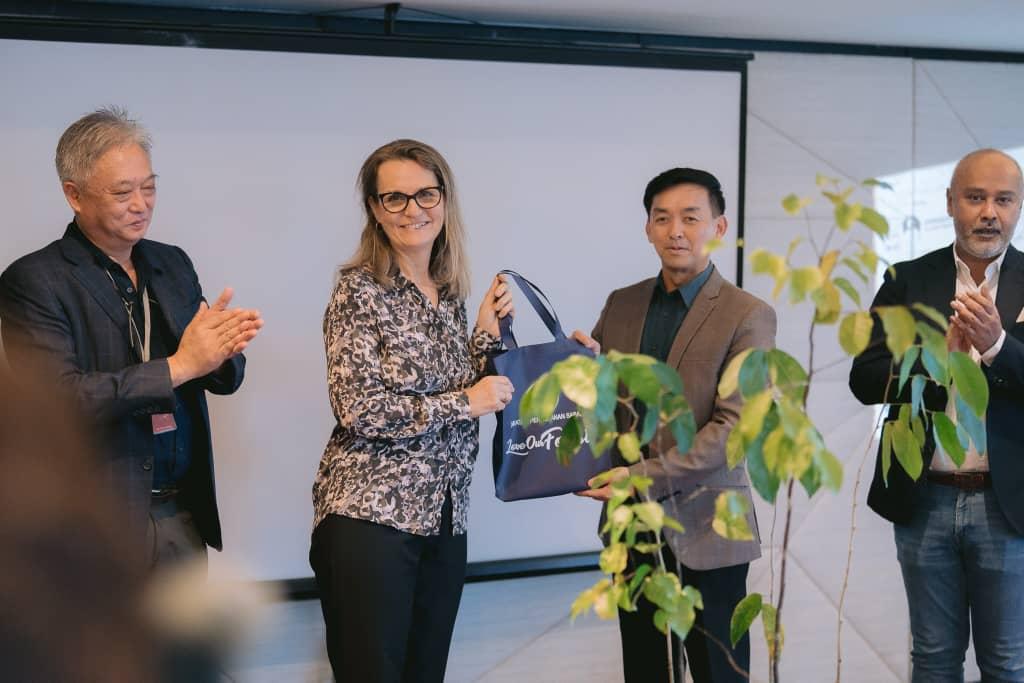Launch of Sabah and European Union Partnership: Update of Sabah TLAS to meet EU Market Requirements

Kota Kinabalu, 18th June 2024 - Building on shared values and principles of sustainable development, human rights and environment protection, the Sabah Forestry Department and the European Union have today officially launched a groundbreaking partnership, to update the Sabah Timber Legality Assurance System (TLAS) to meet EU market requirements.
The launch of the Sabah and European Union Partnership to update the Sabah TLAS, was presided by Dr Audrey-Anne Rochelemagne, First Secretary (Team Leader for Cooperation: Malaysia and Thailand), Delegation of the European Union to Thailand and Datuk Frederick Kugan, Chief Conservator of Forests, Sabah Forestry Department. The partnership demonstrates the forward looking approach of the Sabah Forestry Department towards environmental and social sustainability.
This activity marks a significant milestone in Sabah's ongoing efforts to guarantee sustainable and legal timber production, demonstrating Sabah’s commitment to combating deforestation and climate change. Established in 2009, the Sabah TLAS is a Due Diligence System that was developed in response to EU requirements under the Forest Law Enforcement, Governance, and Trade (FLEGT) program. This initiative is part of a broader Sustainable Forest Management (SFM) strategy adopted since 1997, aimed at ensuring all timber trade between Malaysia and the EU is regulated through rigorous due diligence measures.
Over the past decade, Sabah TLAS has played a pivotal role in enhancing compliance, transparency, and forest governance. Its Compliance Certificate has gained international acceptance in key timber trade markets, including Europe, Australia, the USA, Japan, and Korea.
The activity will involve alignment of the Sabah TLAS with the European Union Deforestation Regulation (EUDR). Beside aligning with the EUDR, the Sabah TLAS will also align with the EU Corporate Sustainability Due Diligence Directive (CS3D) that aims to foster sustainable and responsible corporate behaviour, contributing to the EU and Malaysia’s broader goals of promoting human rights and environmental sustainability. By integrating these frameworks into the Sabah TLAS, the Sabah Forestry Department are proactively advancing environmental and social governance. This alignment will not only enhance the credibility and marketability of timber products but also position Sabah as a leader in sustainable forestry management. It will enhance the competitiveness of the Sabah timber industry and improve prospects for participating in global value chains.
The partnership to update the Sabah TLAS will enable Sabah timber to be harvested in line with EU market requirements. The EU, an attractive single market of 27 countries, is the largest trade bloc in the world and accounts for around 15% of the world’s trade in goods. It is the fourth largest destination for Malaysian exports. The EU is also the second largest source of foreign direct investment for Malaysia, with €25.2 billion in 2022.
The activity will involve a series of consultations and workshops with government agencies of the Implementing Agencies Coordination Committee (IACC), the Sabah Timber Industries Association (STIA), the Timber Association of Sabah (TAS), and upstream and downstream timber industries. Training and support for Sabah stakeholders will ensure they are well-equipped to meet the new requirements.
Datuk Frederick Kugan, Chief Conservator of Forests, expressed his confidence in the collaboration with EU experts, stating, ‘This partnership is a crucial step towards aligning the Sabah TLAS with EUDR and CS3D standards. We are committed to enhancing our environmental governance and ensuring our timber products meet the highest international standards’.
While we are committed to enhancing our environmental governance and ensuring our timber products meet the highest international standards’, the system most importantly must factor in the current state development agenda and plans.
